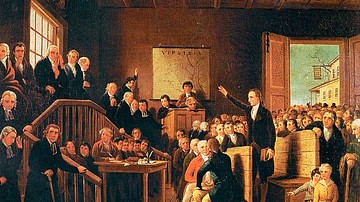Search
Search Results

Definition
Henry Morgan
Sir Henry Morgan (c. 1635-1688) was a Welsh privateer who operated in the Caribbean against the Spanish Empire and then became Lieutenant Governor of Jamaica. Morgan was a charismatic and able military leader who masterminded devastating...

Definition
Pilgrimage of Grace
The Pilgrimage of Grace is the collective name for a series of rebellions in northern England, first in Lincolnshire and then in Yorkshire and elsewhere between October and December 1536 CE. Nobles, clergy, monks, and commoners united to...

Definition
Parson's Cause
The Parson's Cause was a legal and political controversy that arose in the British colony of Virginia in the early 1760s. In response to the royal veto of the Two Penny Act, a policy passed by Virginia's House of Burgesses, a young lawyer...

Definition
Eleanor of Aquitaine
Eleanor of Aquitaine (l. c. 1122-1204 CE) was one of the most impressive and powerful figures of the High Middle Ages (1000-1300 CE) – male or female – whose influence shaped the politics, art, medieval literature, and perception of women...

Definition
William I of Scotland
William I of Scotland, also known as 'William the Lion' after his heraldic emblem, reigned from 1165 to 1214 CE. Succeeding his elder brother Malcolm IV of Scotland (r. 1153-1165 CE), William was faced with a shrinking kingdom, but he harboured...

Definition
Henry David Thoreau
Henry David Thoreau (1817-1862) was an American philosopher, writer, naturalist, and political activist. He is best known for his book Walden, published in 1854, which recounts his two-year experiment living alone in a small cottage at Walden...

Definition
William Tyndale
William Tyndale (l.c. 1494-1536) was a talented English linguist, scholar and priest who was the first to translate the Bible into English. Tyndale objected to the Catholic Church’s control of scripture in Latin and the prohibition against...

Definition
German Crusade 1197-8 CE
The German Crusade of 1197 CE, also known as the 'Emperor's Crusade', was led by the Holy Roman Emperor Henry VI (r. 1191-1197 CE). Although the emperor died on his way east, his army did capture Beirut from the forces of the Ayyubid dynasty...

Article
Henry Box Brown on Slavery in the United States
The Narrative of the Life of Henry Box Brown (1851) is the autobiography of Henry Box Brown (l. c. 1815-1897), who became the most famous fugitive slave of his time when he had himself shipped in a box from Richmond, Virginia, to Philadelphia...

Article
The Wars of the Roses: Consequences & Effects
The Wars of the Roses (1455-1487 CE) was a dynastic conflict where the nobility and monarchs of England intermittently battled for supremacy over a period of four decades. Besides the obvious consequences of Lancastrian and Yorkist kings...